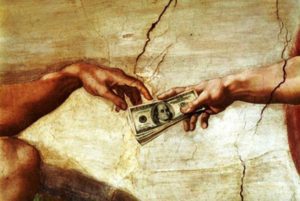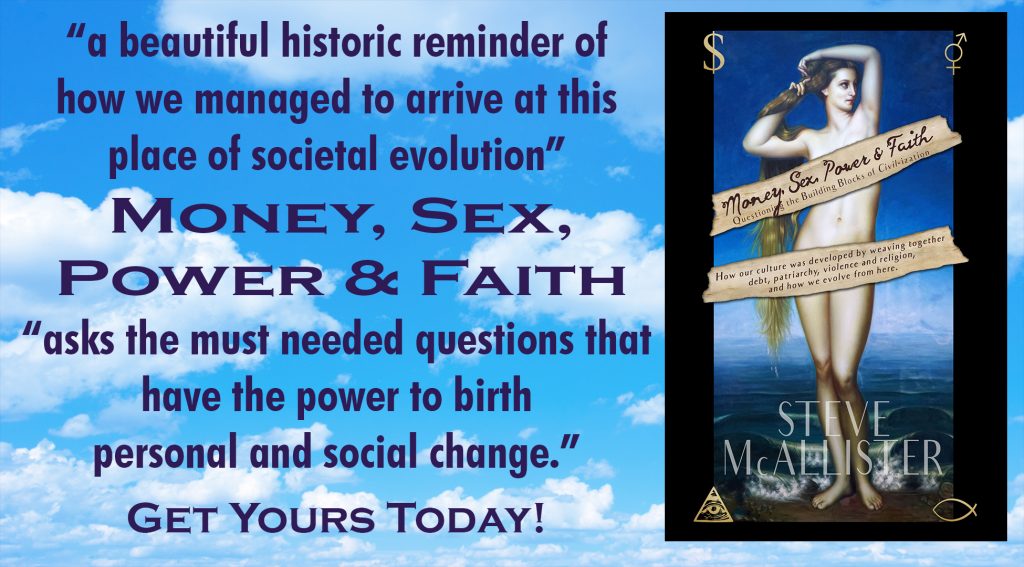The following is a chapter from Money, Sex, Power & Faith.
Order your copy in paperback or for Kindle!
“Religion is what keeps the poor from murdering the rich.” – Napoleon Bonaparte
Throughout the entire Macedonian region, as the terms of banking as a way of life were becoming more integrated into the developing nation-states, what would become the Judeo/Christian/Islamic heritage was also spreading throughout the region, as the legends of Abraham, Moses, Jacob, and Isaac made their way from mouths to ears. For the next few hundred years, the growth of money was intertwined with the growth of these religions so closely that money is said to be mentioned in the Bible more times than heaven.
“The writers of the Bible anticipated the problems we would have with money and possessions; there are more than 2,000 references,” says Peter Grandich, co-founder of Trinity Financial Sports & Entertainment Management Co., and author of Confessions of a Wall Street Whiz Kid.
 Obviously, a good portion of those references are warnings about the dangers of money, but quite a few of them, as abundance gospel preachers like Joel Osteen say, are guidelines for a better financial flow. Nevertheless, most likely due to the initial fallibilities that were seen in the new game of money, the Bible even included a reset button to help restore the inequalities created by the delusions of finance and property, as well as the environmental devastation caused by totalitarian agriculture. Although this dictate was smack dab in the middle of the Pentateuch, the first five book of the Bible, often believed to be written by Moses, the year of Jubilee has been largely ignored by the vast majority of both Jews and Christians.
Obviously, a good portion of those references are warnings about the dangers of money, but quite a few of them, as abundance gospel preachers like Joel Osteen say, are guidelines for a better financial flow. Nevertheless, most likely due to the initial fallibilities that were seen in the new game of money, the Bible even included a reset button to help restore the inequalities created by the delusions of finance and property, as well as the environmental devastation caused by totalitarian agriculture. Although this dictate was smack dab in the middle of the Pentateuch, the first five book of the Bible, often believed to be written by Moses, the year of Jubilee has been largely ignored by the vast majority of both Jews and Christians.
In Leviticus 25, only 5 chapters after the list of sexual death sentences, it is written that every 50 years, everyone should return to their own property, all debts should be forgiven, and all slaves should be freed. Basically, this overlooked biblical tradition was supposed to serve as a sort of reset to the game of human civilization so that we wouldn’t get too caught up in our own nonsense.
Unfortunately, in the last thousand years since the Bible has been bound, and the centuries of oral tradition that came before, in ignoring this divinely mandated forgiveness, we have missed out on quite a few Jubilees.
There are those who believe that mini-Jubilees were common in the early days of our record-keeping, and that the biblical account was merely paying credence to what was actually happening in the world around the writer, although it never actually manifested the experience through the Church. Due to the fact that debt would often reach unmanageable proportions within 7 years and preposterous proportions within 50, the forgiveness of debt was the only possible solution for most. It wasn’t necessarily due to the benevolence of God, but more due to the entire concept of debt as unsustainable, and its incapacity to ever be resolved. When usury, or interest, was added as a component, debt would always become unwieldy, a notion that the Church held for centuries as it sensibly prohibited the practice.
One of the reasons that modern religious folk may not give too much attention to the 25th chapter of Leviticus, and the guidelines for forgiving debt and freeing slaves every 50 years therein, is due to the fact that halfway through, after everyone has happily returned to the land of their birth to be with families free of debt, the chapter turns to instructions of rounding the slaves back up. I wonder if the year of Jubilee would more likely be practiced if it didn’t condone the ownership of another human being at all.
Order your copy of Money, Sex, Power & Faith today!


